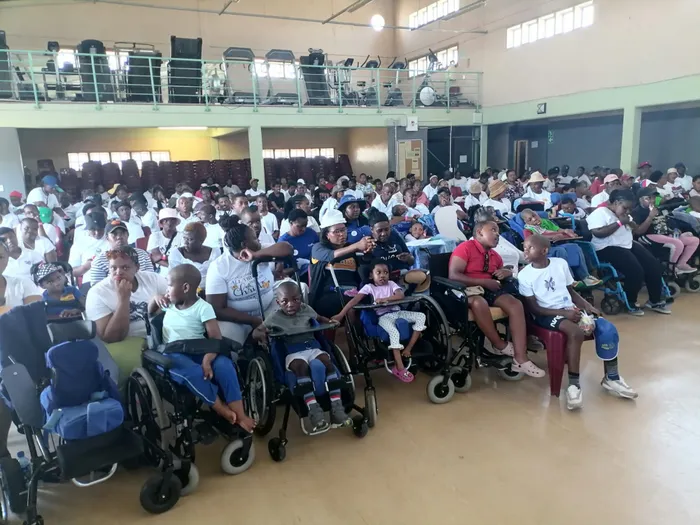Disabled make their voices heard

People living with disabilities gathered at Eyethu Multipurpose Centre on on Thursday November 30.
Luncedo Qamani had his left leg amputated to save his life after he was in a car crash five years ago. He needed intensive rehab and lost his job as a salesman.
Mr Qamani was among about 50 people who took part in a fun disability walk, from the KwaNothemba Workshop for the Disabled premises to the Eyethu Multipurpose Centre, in Khayelitsha, on Thursday November 30, ahead of International Day of Persons with Disabilities, on Sunday December 3.
In South Africa, National Disability Rights Awareness Month is from November 3 until December 3, with the latter known as National Disability Rights Awareness Day.
The walk was organised by Sibongile Day and Night Care Centre, the KwaNothemba Workshop for the Disabled and others to raise awareness of the plight of the disabled.
Mr Qamani said the event showed the community that people with disabilities might have different needs from the rest of the community, but that did not mean they should be treated as outcasts.
In many cases, communities turned a blind eye to the needs of the disabled, he said, adding that being disabled did not mean you could not do things; it just meant you did things differently.
“It's not easy living with a disability. The journey is tough. You will find that it's extremely hard to get employment opportunities.
“My life changed for me after my accident as I battled to crack into job opportunities. I appeal to the public that they should not turn a blind eye to a person who is in need of help.
“We should be treated equally with normal people, and people should not think that they are doing us a favour when they treat us equally. Beyond the disability, there is a human being who is trying to make ends meet just like everyone else."
KwaNothemba Workshop for the Disabled manager Sylvia Qhaba said the disabled should not be left behind when community leaders made decisions about the future of Khayelitsha and its development.
The disabled should be treated like everyone else and not be discriminated against or pitied because of their disabilities, she said, adding that events such as the walk showed disabled people they were not alone and there were organisations where they could get help.
"We want our voices to be heard. We want our presence to be felt just like everyone else. People must look at the person before anything else. We want our people from today to change their mindset about people living with disability.
“We want people to know we are ambitious just like them, and we want the best for ourselves and our families."
